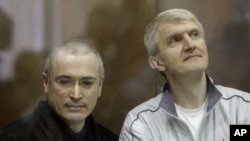In the second trial of Russian oil executive Mikhail Khodorkovsky and his business partner Platon Lebedev, both men were given new sentences that effectively added six years to the eight they have already spent behind bars.
Defense lawyer Yury Schmidt said the sentences were the result of political pressure from Russian Prime Minister Vladimir Putin.
In a written statement, U.S. Secretary of State Hillary Clinton said the convictions raised serious questions about the rule of law in Russia being overshadowed by political considerations. In a separate statement, the White House noted that it was "troubled by the allegations of serious due process violations" and underscored that "the apparent selective application of the law to these individuals undermines Russia’s reputation as a country committed to deepening the rule of law."
German Chancellor Angela Merkel echoed those observations saying, it appeared that "political motives played a role" in the proceedings.
Mr. Khodorkovsky became one of Russia's richest and most powerful businessmen after acquiring state-owned companies in the 1990s, including the oil firm Yukos. That all changed in 2003 when Khodorkovsky challenged then-President Putin and supported the political opposition. Shortly thereafter, Khodorkovsky was arrested and has now faced two trials with his associate Mr. Lebedev, the first for tax evasion and fraud, and the second for embezzlement and money laundering.
Defense attorneys in the Khodorkovsky case have been unable to cross-examine witnesses, and some defense witnesses were prevented from taking the stand. Authorities have pressured and harassed former colleagues to testify for the prosecution.
According to Amnesty International's Director for Europe and Central Asia, Nicola Duckworth, "All evidence points to a pattern of political motives and interference having obstructed justice in this case." Amnesty International has called for the Moscow City court to overturn the conviction.
These allegations cast a long shadow over the independence of the Russian judiciary and the effective separation of powers in Russia. The Khodorkovsky case and "similar cases have a negative impact on Russia's reputation for fulfilling its international human rights obligations and improving its investment climate," said Secretary Clinton.
The U.S. welcomes President Dmitri Medvedev's modernization plans, but their fulfillment requires the development of a climate where due process and judicial independence are respected. The United States will monitor the appeals process of the Khodorkovsky case.




